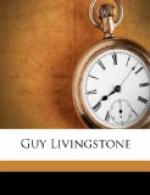CHAPTER XXXIV.
“He
threw
His wrathful hand aloft,
and cried ’Away!
Earth could not hold
us both, nor can one heaven
Contain my deadliest
enemy and me.’”
We were sitting in Livingstone’s chambers one night in the following March, and dinner was just over, when the detective was announced who for months had been in Guy’s pay and on Bruce’s track.
He was a stout, hale man, rather past middle age, with a rosy face, a cheerful, moist eye, and full, sensual lips—just the proper person to return thanks for “The Successful Candidates” at an agricultural meeting. Originally of a kindly convivial nature, he had grown familiar with crime till he despised it. The reward set upon the criminal’s capture was his only standard of guilt. He took a real pleasure in the chase, I imagine, but had no preference for any game in particular, and was quite indifferent whether the cover he had to draw was a saloon or a cellar. He would hunt a fraudulent bankrupt or a parricide with equal zeal, and, when he had caught him, be just as jocularly affable with the one as with the other. In a drama of life and death, the fierce passions of the actors were only so many gleams of light showing him where the right path lay, for which assistance he thanked them heartily. The foulest mysteries of the sinful human heart touched and shocked him no more than the evidences of disease do the dissecting surgeon: with both it was a simple question of defective organization. The possession of secrets, far less weighty than some that he never told, have made men look worn, and miserable, and gray; but he would pat his corpulent leather pocket-book with a self-sufficient satisfaction, scarcely hinting that the publication of its contents would have caused more devastation in some well-regulated families than the bursting of a ten-inch shell in their front drawing-room.
His lips and eyes wore a smile pleasantly significant as he entered, and, before he could speak, Guy leaped up, waving his hand high in irrepressible triumph. “I told you so, Frank. I knew we should find him. Come—come quickly.” He was more excited than I had seen him in the last dozen years.
I exulted too, but I confess a certain repugnance and nervousness mingled with that feeling: it was a new thing to me to stand face to face with a murderer.
Neither of us gave as much attention as it deserved to the narrative with which the officer favored us en route, of how he had been gradually getting the clew to the fugitive’s many doublings and disguises till he came upon his retreat at last. “They mostly make for home when they’re dead beat,” he remarked, alluding to Bruce’s having selected London as his final hiding-place.
We soon reached the spot—one of those dreary by-ways that trend westward out of the Waterloo Road. As we drew up, the outline of a figure revealed itself out of the darkest nook of the dim street, and a man came forward and opened the door of the cab, interchanging a word or two with our companion.




